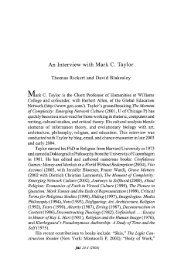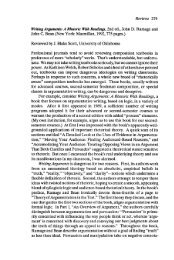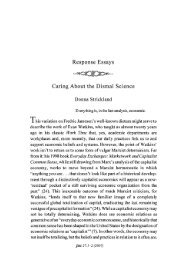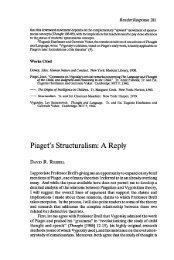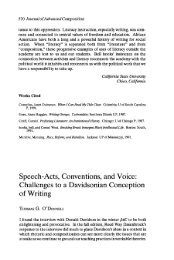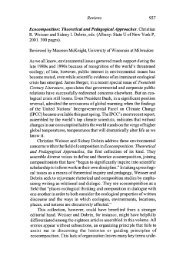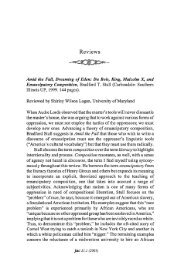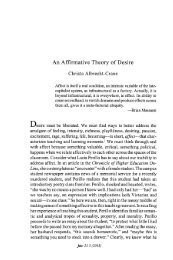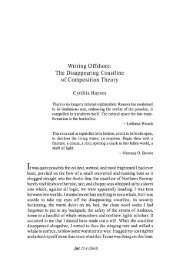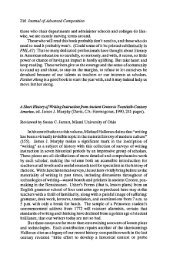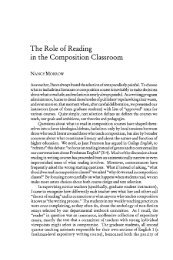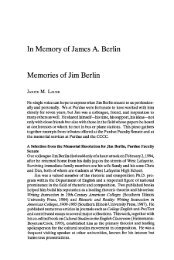Politics, Pedagogy, and the Profession of Composition ... - JAC Online
Politics, Pedagogy, and the Profession of Composition ... - JAC Online
Politics, Pedagogy, and the Profession of Composition ... - JAC Online
Create successful ePaper yourself
Turn your PDF publications into a flip-book with our unique Google optimized e-Paper software.
Bruce Homer 137<br />
Ellsworth's questions <strong>and</strong> my critique seem to suggest not simply that we<br />
should expect from all pedagogies a degree <strong>of</strong> un know ability , but also that<br />
this unknowability justifies absolving ourselves <strong>of</strong> responsibility for our<br />
pedagogy on <strong>the</strong> grounds that <strong>the</strong> effects <strong>of</strong> what we do are, after all, not<br />
strictly speaking under our control; <strong>the</strong>y are ''unknowable.'' Such a<br />
conclusion, however, would only evince nostalgia for transcendent certainty<br />
<strong>and</strong> would effectively give sway to <strong>the</strong> dominant culture's claims<br />
<strong>of</strong> certainty through retreat from resistance to such claims.<br />
Fur<strong>the</strong>rmore, that nostalgia again demonstrates a commodified notion<br />
<strong>of</strong> pedagogy, for it places on pedagogy a burden it cannot possibly<br />
bear alone, assigning it a task it cannot by itself perform. Indeed, we can<br />
see evidence <strong>of</strong> such a view in <strong>the</strong> exclusiveness <strong>of</strong> <strong>the</strong> concern both<br />
Ellsworth <strong>and</strong> her critics have with power in <strong>the</strong> classroom. Such a focus<br />
is suggested by Ellsworth's assertion that for her purposes, "The most<br />
important interruption <strong>of</strong> existing power relations within <strong>the</strong> university<br />
consisted <strong>of</strong> transforming business-as-usual-that is, prevailing social<br />
relations-in a university classroom" (299). This statement makes sense<br />
only if we accept both a unitary conception <strong>of</strong> power <strong>and</strong> a homological<br />
view <strong>of</strong> its exercise in different sites. That is, <strong>the</strong> specific relations <strong>of</strong><br />
power occurring at a pedagogical site are seen as equivalent to relations<br />
<strong>of</strong> power at all o<strong>the</strong>r sites; consequently, to interrupt <strong>the</strong> business-as-usual<br />
<strong>of</strong> <strong>the</strong> university in any <strong>of</strong>its sites constitutes interruption <strong>of</strong> that business<br />
at all its o<strong>the</strong>r sites. Business is business.<br />
If carried to its logical extreme, such a strategy would constitute a<br />
recipe for full containment <strong>of</strong> counterhegemonic efforts, since it would<br />
effectively direct such efforts to those sites <strong>the</strong> dominant has already<br />
foresworn as inconsequential. This is notto dismiss <strong>the</strong> significance <strong>of</strong><strong>the</strong><br />
politics <strong>of</strong> teacher-student relations but to insist that we locate those<br />
relations within <strong>the</strong>ir specific material sites, differentiating between <strong>the</strong><br />
significance <strong>of</strong> power relations in specific instances <strong>and</strong> locales <strong>and</strong><br />
considering <strong>the</strong> interaction <strong>of</strong> those relations among sites. We can account<br />
for <strong>the</strong> particularly complicated <strong>and</strong> angst-ridden experience <strong>of</strong> C&I 607<br />
that Ellsworth describes as being <strong>the</strong> result, in part, <strong>of</strong> her initial failure<br />
to differentiate power in such ways.<br />
By contrast, <strong>the</strong> pedagogy <strong>of</strong><strong>the</strong> unknowable that Ellsworth ends up<br />
calling for appears to require such location, for it is defined as a practice<br />
"pr<strong>of</strong>oundly contextual (historical) <strong>and</strong> interdependent (social)" (323).<br />
As I have argued above, Ellsworth's invocation <strong>of</strong> a pedagogy <strong>of</strong> <strong>the</strong><br />
unknowable itself suggests a lingering desire for a commodifiable pedagogy,<br />
albeit one that paradoxically fails to "deliver" a consumable



